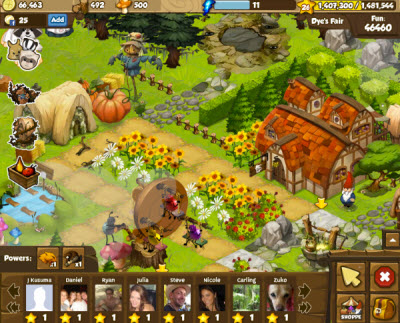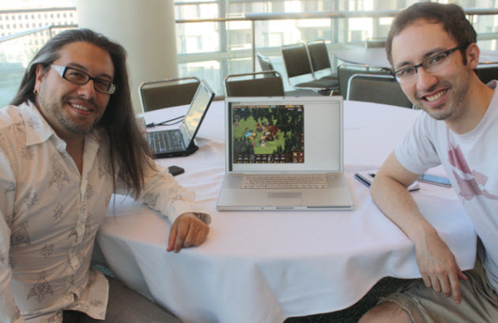传统游戏老将转战Facebook,LOLapps新作将亮相
约翰·罗梅洛(John Romero)所开发的单机游戏《毁灭战士》(Doom)和《雷神之锤》(Quake),深刻影响了一代的射击游戏狂热分子,他现在正准备推出其首款可爱风格的Facebook游戏《Ravenwood Fair》。
作为社交游戏开发商LOLapps公司的一名顾问,约翰·罗梅洛(下图左)在过去两个月中带领一支仅有8名美术设计师和程序员的小团队开发了这款社交游戏,这也是LOLapps公司立志成为社交游戏重量级选手而强力打造的一部作品。
LOLapps原本打算在上周五推出该游戏,不料好事多磨,当天Facebbok以该公司游戏“违反Facebook有关规定”为由,对所有的LOLapps游戏下了封杀令,《华尔街日报》所挖出来的向第三方公司传送用户数据的游戏名单中,LOLapps的产品也赫然在列。此事一度闹得沸沸扬扬,但所幸LOLapps已向Facebook交涉,又承诺将保证用户的信息安全,遵守Facebook隐私条款,此事才算顺利收尾。LOLapps的游戏也得以在周日复出,原本以为这起风波会惊动一些用户,奇怪的是大部分玩家根本漠不关心,对LOLapps游戏仍然情有独钟。
在之前的报道中,我们曾提到LOLapps是一家颇具规模、但并不为人所知的Facebook社交游戏公司,这是因为该公司主要开发让用户自主创造礼物和小测试的游戏,虽然这些游戏的每月活跃用户达1.5亿,但在Facebook的数据中这些游戏不会以LOLapps的名义显示,只会出现在玩家的名下。尽管如此,LOLapps公司的联合创始人凯文·斯图尔特(Kavin Stewart,下图右)表示,这些游戏的流量仍然发挥了作用,因为LOLapps可以通过这些简单的小测试和礼物交叉推广他们的社交游戏,这些游戏也因此比小测试和礼物更容易实现营收,LOLapps的产业链也就这么做大了。
如果LOLapps的产业发展进一步壮大,该公司就有可能跻身社交游戏行业的头阵,与Zynga、CrowdStar、EA旗下的Playfish、迪士尼旗下的Playdom等公司平起平坐,也意味着风险投资者和投资银行家也将扣响LOLapps的大门。
斯图尔特表示,为实现这一目标,LOLapps选择了一些像罗梅洛这样的设计师,以及同样具有电子游戏设计经验,并转向社交游戏的创意总监布伦达·布朗斯怀特(Brenda Brathwaite)加入自己的阵营。
罗梅洛本人就是一个多重角色,他曾是id Software公司的联合创始人之一(其他几位分别是John Carmack、 Adrian Carmack、Tom Hall),而且是传奇电子游戏《重返德军总部》(Wolfenstein 3D)、《毁灭战士》、《雷神之锤》的设计者。这些游戏在90年代是超暴力风格的第一人称射击游戏,深刻影响了电子游戏世界。其后罗梅洛离开了id公司,先后在一系列初创游戏企业中就职,比如说Ion Storm(硬核游戏制造商)、Monkeystone Games(社交游戏开发商)、Slipgate Ironworks(Gazillion Entertainment公司旗下的一个工作室)。虽然他在这些公司的成就都不像在id Software那样辉煌,但至少坚持了一段长期的游戏生涯,接触过不同的游戏风格。
罗梅洛目前仍就职于Gazillion公司,但斯图尔特表示,如果他的第一款Facebook游戏走红了,LOLapps十分欢迎罗梅洛加入公司董事会。当记者问及这款新游戏是否会有暴力元素时,罗梅洛予以否认,称Facebook游戏和传统的射击游戏是两回事。
不过他同时还认为,Facebook大多数玩家是上了年纪的女性,她们会喜欢更有深度的游戏。他指出Zynga公司首席游戏设计师布赖恩·雷诺兹(Brian Reynolds)开发的《拓荒者小镇》(FrontierVille),也是资深的传统电子游戏设计师,称相信像雷诺兹一样富有经验的游戏开发者有能力满足Facebook玩家不断上涨的需求。
据了解,《Ravenwood Fair》有点类似于《拓荒者小镇》,也同样支持玩家在游戏中砍树并建造自己的农场,不过这款游戏确实是原创作品,而且比多数Facebook游戏拥有更多的声音选项。
罗梅洛及其团队历时两个月开发了这款游戏,如果它成功了,该团队还会继续扩大游戏规模。罗梅洛表示,他沉迷于这种小规模、手工艺人式的游戏开发,而掌机和大型PC在线游戏往往需要大量的人力、财力和时间投入,那种游戏开发比较无趣,而且难以持续发展。
罗梅洛称Facebook游戏的好处不仅仅在于更低的支出,“它比MMO游戏拥有更广泛的用户基础,Facebook是一个很棒的平台。”
当记者问罗梅洛是否有人揶揄他为何不制作硬汉风格的传统游戏时,他称目前还没有这种情况,而且他开始接触手机游戏时就已经涉足可爱风格的游戏开发。也许有一天,他会因社交游戏而再度成名,《Ravenwood Fair》如果一战成名,那么这些原先的电子游戏先驱也许会发现他们也对社交游戏行业也做出了重要贡献。(本文为游戏邦/gamerboom.com编译)
Creator of the fierce Doom and Quake games tries his hand at a cute Facebook game
John Romero is the creator of the Doom and Quake games that have haunted the memories of a generation of gamers with over-the-top shoot-em-up violence. Now he is trying his hand at making a cute Facebook game called Ravenwood Fair.
As a consultant to social gaming firm LOLapps, this kinder and gentler Romero (pictured, left) designed and built the game in the past couple of months with a small team of eight artists and programmers. Ravenwood Fair debuts on Facebook today, and it is one more cog in LOLapps’ grand strategy to become a big player in social games.
LOLapps was going to launch the game last Friday, but it got pulled over by the Facebook police. Facebook pulled down all LOLapps games on Friday and restored them Sunday night, citing only “violation of Facebook’s policies.” The Wall Street Journal reported that some games, including LOLapps titles, were wrongfully transmitting user data to third-party companies. Of those companies, only LOLapps was singled out and shut down. LOLapps said it worked with Facebook to restore its games and will ensure it can protect users’ safety and abide by Facebook’s policies.
Hopefully for LOLapps, that will be enough for its users to flock back to its old games and play the new one as well. The privacy concern may spook some users, but odds are strong the bulk of users won’t care.
The new game uses the same underlying software as Critter Island, a major game that LOLapps launched a couple of months ago and which now has 1.2 million monthly active users.
As we noted in our previous story, LOLapps is one of the big Facebook social gaming companies that no one has heard about. That’s because most of its 150 million monthly active users come from apps that the company created to allow users to create gifts and quizzes. These apps don’t show up in Facebook’s data as belonging to LOLapps; they show up under the names of the users. Nevertheless, that traffic is very important, said Kavin Stewart (pictured, right), co-founder of San Francisco-based LOLapps, in an interview. That’s because LOLapps can use those simple quizzes and gifts to cross-promote its social games. The social games will likely monetize far better than the quizzes or gifts, allowing LOLapps to move up the food chain.
If the evolution proceeds far enough, LOLapps could join the upper ranks of the social game industry elite such as Zynga, CrowdStar, EA-Playfish and Disney-Playdom.
That also means that the venture capitalists and investment bankers will come knocking on LOLapps’ doors. (The press and conference organizers are also paying attention: Arjun Sethi, chief executive of LOLapps, will speak on a case studies panel at our DiscoveryBeat 2010 conference on Monday).
To move up the ladder, Stewart says the company has to step up its game by tapping game designers such as Romero, and its creative director Brenda Brathwaite, a longtime video game designer who also migrated to social games.
Romero himself has been an evolving character. He was a co-founder of id Software (alongside John Carmack, Adrian Carmack, and Tom Hall) and a designer of many legendary video games such as Wolfenstein 3D, Doom, and Quake. Those games introduced the hyper-violent first-person shooter genre to the world in the 1990s and changed video games forever. Romero left id and worked at a series of game startups: hardcore game maker Ion Storm, mobile game maker Monkeystone Games, and Slipgate Ironworks, a studio which has become part of Gazillion Entertainment. He never quite recaptured the magic of the creative maelstrom at id Software. But he has sustained a long career in games and crossed many different genres over time.
In an interview, Romero said that his broad experience helped him prepare for his latest project. He is still employed at Gazillion, where his major MMO game was canceled, and his consulting for LOLapps. But if it his first Facebook game works out, LOLapps will no doubt be happy to bring him aboard full-time, Stewart says. As Romero demonstrated his cute game, I couldn’t help but interrupt and ask, “Are there any shotguns in the game?” (a reference to the ever-useful weapon of Doom).
“There are no shotguns,” he said. “We’re talking about Facebook here.”
But Romero thinks that Facebook gamers — many of them older women — are more than ready for deeper games. He points to FrontierVille, which was designed by Zynga’s chief game designer, Brian Reynolds, another veteran traditional video game designer. Romero believes that game developers with the depth of experience of Reynolds will be able to meet the rising expectations of Facebook’s gamers.
The game bears a little resemblance to Zynga’s FrontierVille, where you chop wood and build a farm. But it is an original story and it has a greater palette of sounds than most Facebook games. It took Romero and his handful of people about two months to make it. If it succeeds, they will continue to expand the universe of Ravenwood Fair. Romero said he could get addicted to this kind of small-scale, craftsman-like game development. By contrast, making console or huge PC online games can take scores or hundreds of employees, years of work, and budgets in the tens of millions. That kind of development isn’t fun, nor is it sustainable, Romero said.
“I love doing a small game like this,” Romero said. “And more people could play it than would ever play an MMO. Facebook is an amazing platform.”
I asked Romero if anyone had teased him for not making a macho hardcore game. Not so far, he said, and he started branching out into cute content when he made mobile games anyway. Perhaps, one day, he’ll be known for something other than Doom or Quake. Ravenwood Fair is just about to launch. If it succeeds, video game pioneers such as Romero may find that they’re going to be very welcome contributors to the social gaming industry.(source:venturebeat)









































 闽公网安备35020302001549号
闽公网安备35020302001549号